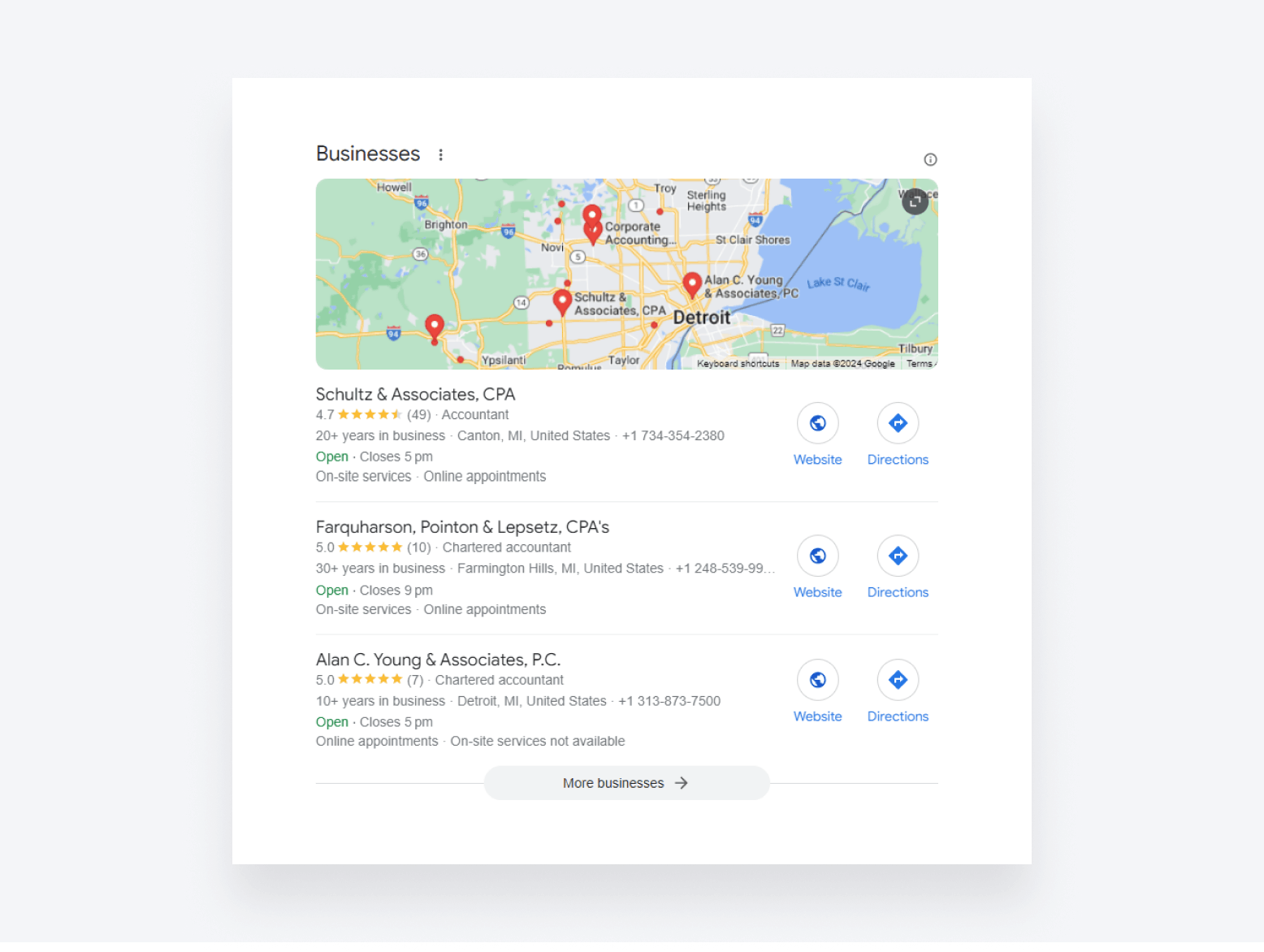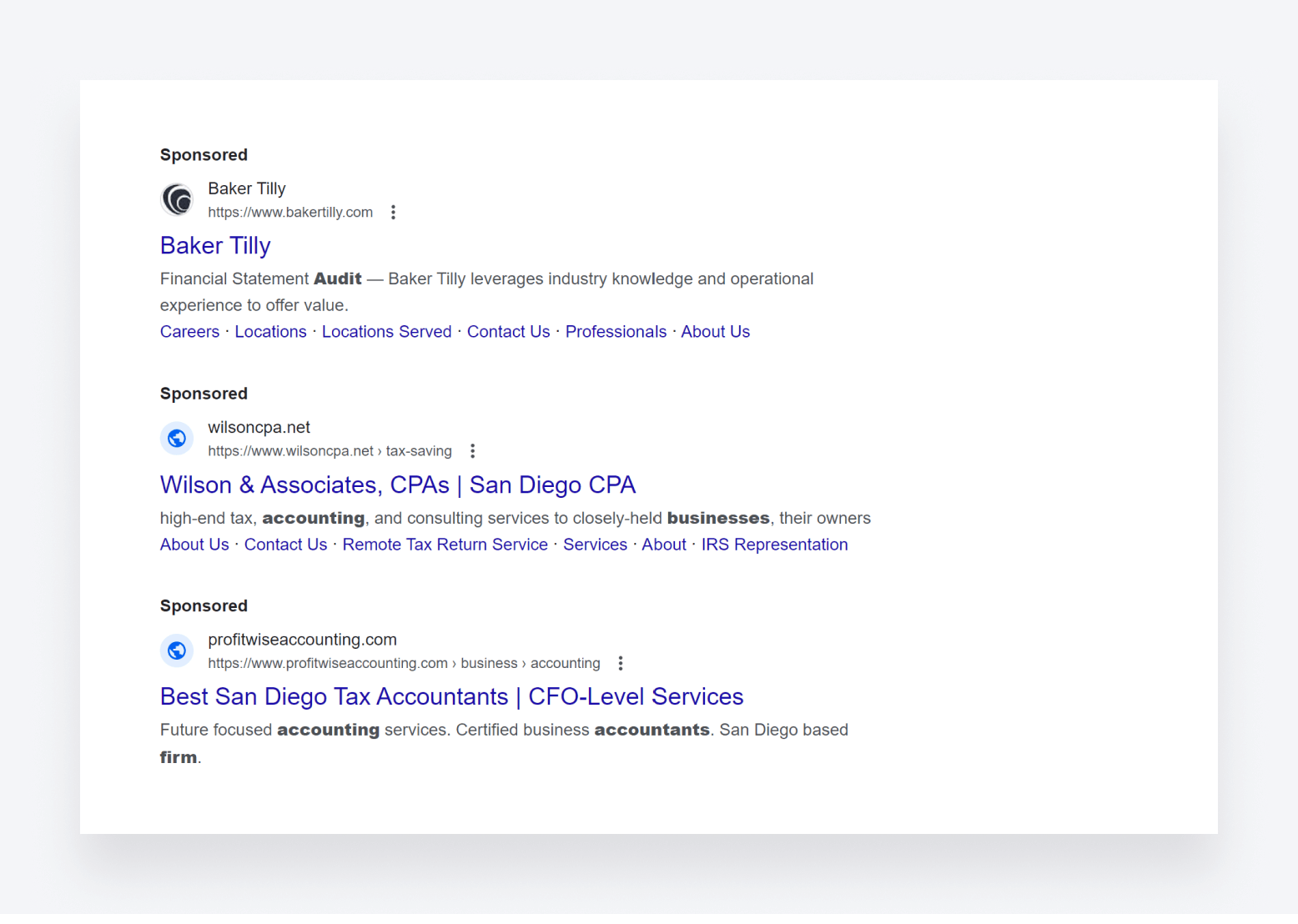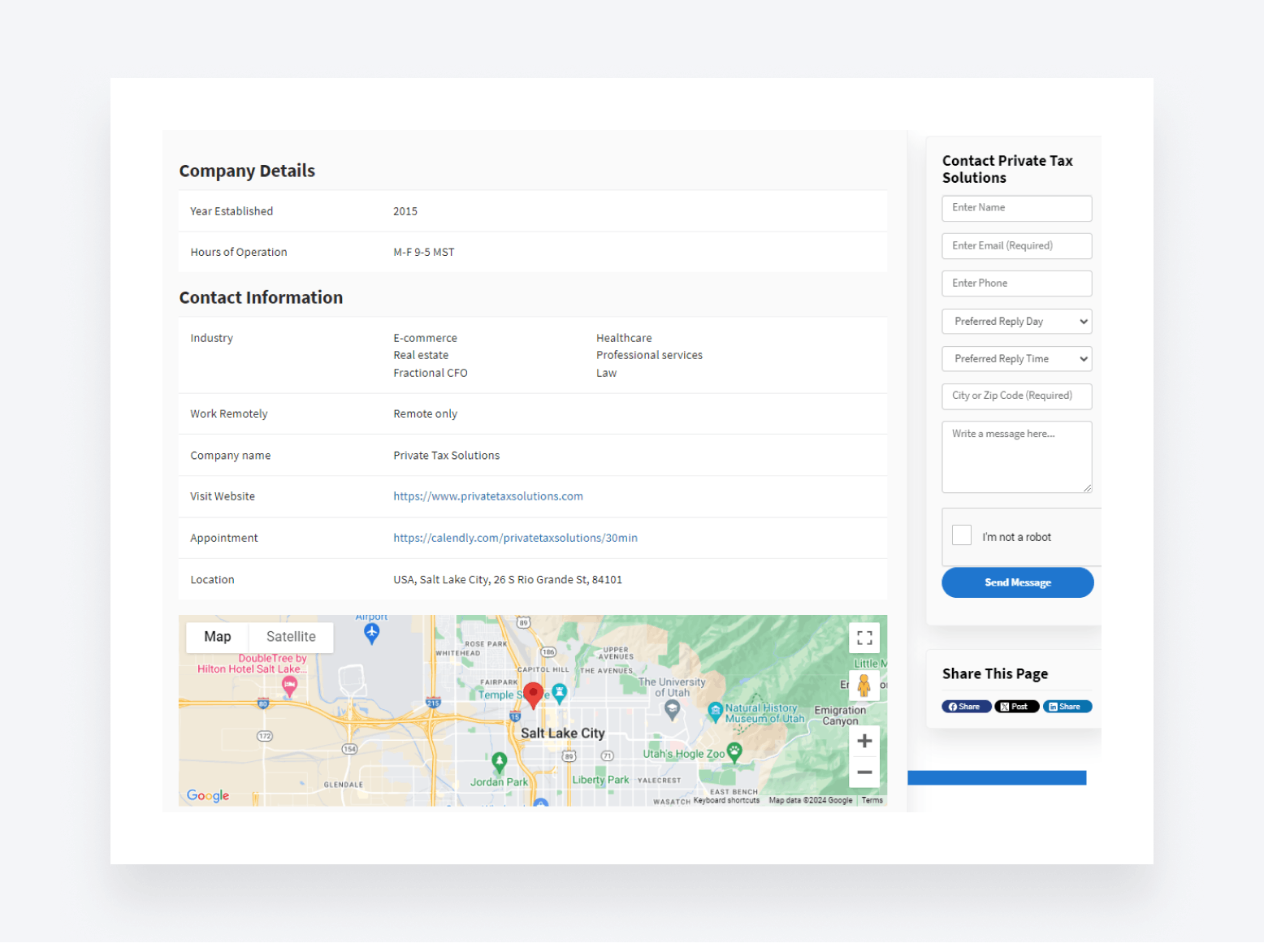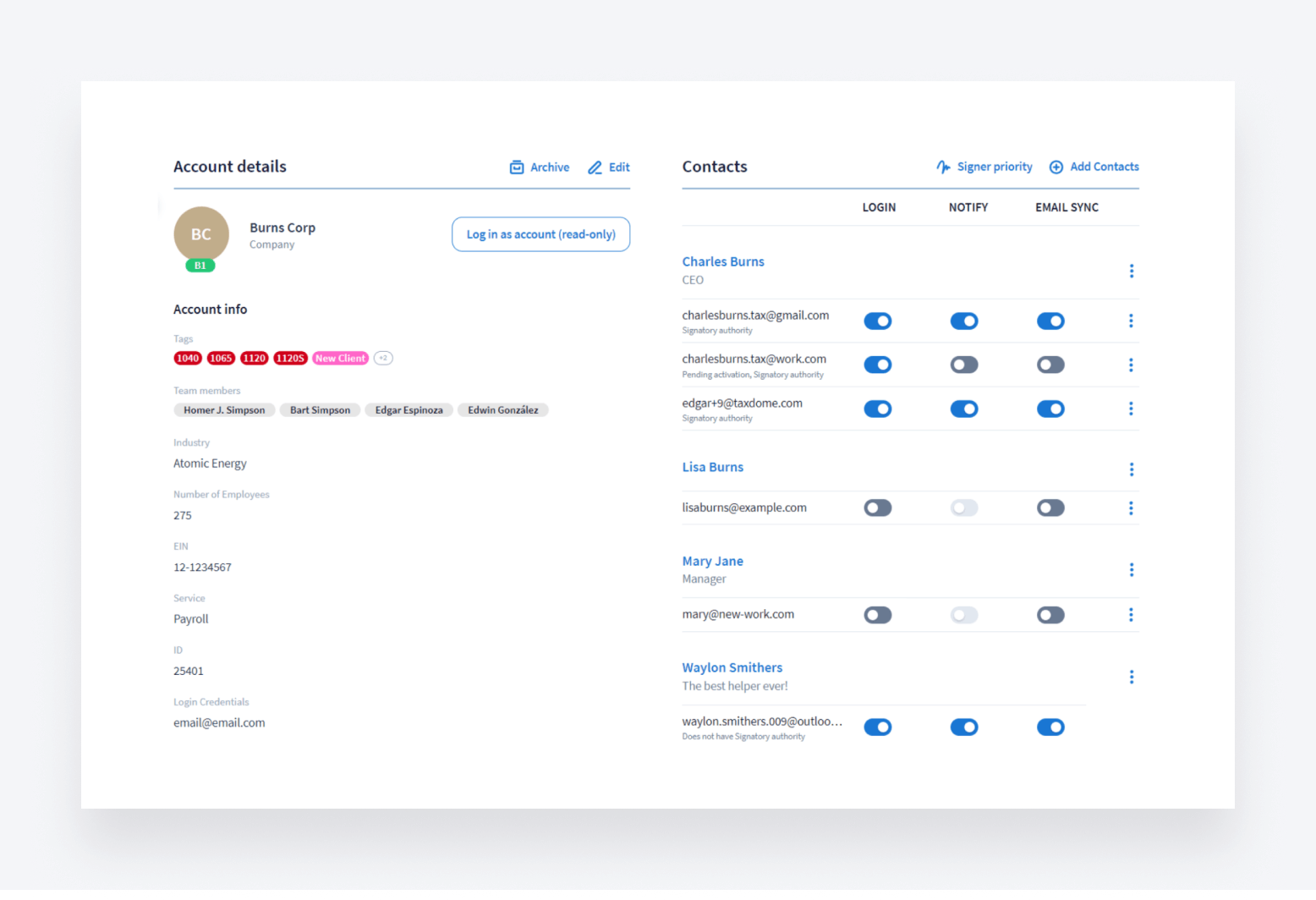
To be successful and grow, accounting businesses need to attract a steady stream of new clients. But with so many firms to compete with, this is easier said than done. The most successful firms have an effective lead generation strategy — and if you’re wondering what that involves, you’ve come to the right place.
In this article, we’ll explore some of the most powerful strategies for acquiring new clients, including top tools and best practices that will make you stand out from the crowd.
Let’s dive in.
11 lead generation strategies for accountants
Here are some of the most effective strategies you can implement to find, engage, and attract new clients:
- Search engine optimization (SEO)
- Google My Business
- Content marketing
- Email marketing
- Lead magnets
- Partnerships
- Conferences
- Pay-per-click (PPC) advertising
- Podcasts
- Directories
1. Optimize your website with SEO
So you’ve gone to the hassle of building a website. Job done, right? Not quite. Having a website is great, but if nobody knows it exists, it won’t bring in any new leads. This is why SEO is so important.
SEO comprises a range of different strategies designed to ensure that Google ranks your website highly when people enter certain search queries. The better your SEO strategy, the higher your website will rank — and the more leads it will generate.
Not only is SEO a powerful lead-generation strategy, but it’s also one of the more cost-effective and scalable ones, with the power to bring in a steady stream of new leads over weeks, months, and years. An effective SEO strategy includes:
- Identifying the right keywords — and inserting them into your content strategically
- Creating a steady stream of relevant, high-quality content
- Optimizing your website’s structure
- Building a strong external and internal link profile
- Ensuring that your website works effectively on all devices
- Identifying and fixing any technical issues
📖 Further reading: there’s a lot to learn when it comes to SEO, so for a deeper dive into this powerful lead-gen approach, check out our article: SEO for accountants: 16 effective strategies to attract new clients.
There are tons of tools you can use to help you find the right keywords, analyze your competitors, and supercharge your website’s SEO. Here are some of the most popular:
- Semrush — the market leader and one of the best SEO all-rounders
- Ahrefs — a powerful tool that excels at competitor research and keyword analytics
- Moz — a true OG in the SEO space, Moz is great for analyzing competitors and backlinks
- Surfer SEO — an AI-powered SEO tool with an excellent content editor
- Google Search Console — an essential free SEO tool for website owners

Ahrefs’ keyword explorer tool helps you choose the most effective keywords for your website.
2. Capture local interest with Google My Business
Google My Business is a free service that acts as an online business directory. By setting up a Google My Business profile, you’ll enable people to find your business in the local search results, with Google listing it on a map. See the examples below:

Google My Business is an easy but powerful way to generate local leads and establish yourself as a trusted accountant in your local neighborhood. If you consider that 97% of users learn about local businesses online, it’s easy to see the value in this one.
Besides including your address, contact info, office hours, and location on a map, Google My Business allows existing clients to leave reviews, providing an extremely powerful form of word-of-mouth marketing.
It’s worth noting that Google My Business is detached from your website and SEO. In fact, you don’t even need a website to get listed. To register your business, head here and follow the setup steps.
3. Leverage content marketing to drive engagement
Content marketing is a tried-and-tested way to engage potential clients, build trust, and promote your business, with 74% of companies agreeing that it increases lead generation.
There are so many ways you can approach content marketing, each with its own unique benefits. For example, your content marketing strategy can include:
- Blog posts, e-books, and white papers
- Web content and landing pages
- Service descriptions
- Customer success stories
- Infographics and animations
- Interviews and thought leadership pieces
- Video content and podcasts
- Social media content
- Emails and newsletters
Content marketing can engage leads at every stage of the sales funnel, from awareness through to conversion. For example, you might write a blog post about the tax filing process during the awareness stage, as people will associate your business and brand with expertise and useful advice. Later on, when people know who you are and what you offer, you might convert them with a powerful customer success story.
The key to content marketing isn’t just great content — it’s getting the lead to do something. This is why you need clear calls to action (CTAs) that prompt the reader or viewer to schedule a call, download an ebook, sign up for an event — or whatever else you might want them to do.
There are tons of tools you can use to streamline and elevate your content marketing processes, but here are just a few well-known examples:
- Content management: WordPress, HubSpot CMS, Umbraco
- Writing and editing: Google Docs, Grammarly, Hemingway
- Generative AI: ChatGPT, Claude, Google Gemini
- Graphic design: Canva, Adobe Photoshop, Visme
- Email marketing: Mailchimp, HubSpot, MailerLite
- Social media: Buffer, Hootsuite, Sprout Social
4. Convert leads with email marketing
We already touched on email marketing in the previous section, but it’s worth expanding on. Email marketing is one of the more traditional forms of content marketing, but it’s also one of the most effective. In fact, for each dollar spent on email marketing campaigns, businesses get an impressive $36 back in ROI!
But success through email marketing isn’t a given. With the average person receiving north of 120 emails every day, you have to work hard to get your emails seen. Here are some best practices to help with that:
- Use short and catchy email subject and preview lines that pique interest
- Keep emails short and sweet — sales emails shouldn’t be more than about 120 words
- Personalize your emails where possible
- Include clear calls to action (CTAs) that guide recipients to the next steps
- Send emails at opportune times — e.g. during the morning or afternoon, when people are likely to be online
5. Use lead magnets to capture contact information
To send emails to leads, you’ll first need to cultivate an email list of people who have shown interest in your business and services. This is where lead magnets can be a powerful tool.
Lead magnets are pieces of high-value content that people can access and download by entering their contact details. In other words, they are a way to get people to voluntarily give you their name and email address — and with it, their permission for you to contact them. Here are some examples:
- White papers
- Ebooks and guides
- Accounting templates
- Webinars and other live events
Below is an example from Blue Fox, an accounting firm based in Miami. By clicking on the “Download it here” button, website visitors are prompted to enter their name, email address, and company.

Lead magnets are a highly effective way to generate high-quality leads. But more than that, they also help promote your business, build trust, and educate your prospects about your expertise and services.
6. Form strategic partnerships to capture more diverse leads
Forming strategic partnerships with other businesses can be an effective way to engage with new audiences that you wouldn’t necessarily be able to reach through traditional channels. There are all sorts of approaches you can take here, but here are a few examples:
- Partnering with a financial advice firm to co-host a webinar on financial planning
- Offering bundled services with financial advisory or legal firms
- Partnering with an accounting software provider to offer special offers to users
- Interviewing leaders from the accounting industry to produce engaging content
- Writing guest posts for accounting blogs, with links back to your website
The end goal is always the same, however: to leverage your partner’s authority, expertise, or clientele to boost your own brand and create high-quality leads. You can find suitable businesses to partner with using LinkedIn or business database software such as ZoomInfo.
7. Use LinkedIn to network and find leads
With over 770 million users worldwide, LinkedIn is an incredibly powerful site for finding, engaging, and networking with leads. Because LinkedIn’s audience comprises professionals, business leaders, and other decision-makers, you’ve already narrowed the field compared to other, more general social media platforms such as Facebook or Instagram.
Here are some ways you can use LinkedIn to promote your accounting business and generate leads:
- Create a LinkedIn profile page for your business
- Regularly post relevant and useful content that will resonate with your target audience
- Join LinkedIn groups that are relevant to your industry, services, or target audience — for example, if you primarily serve tech startups, you can join communities for entrepreneurs
- Ensure that your content gets seen with LinkedIn Ads and Sponsored Content
LinkedIn is also an excellent place to nurture connections with existing leads and contacts. By commenting on other people’s posts and sharing your news and views, you can build trust and rapport over time.
8. Attend conferences and other industry events
There are tons of ways to network online these days, but sometimes, you can’t beat meeting people face to face. Attending accounting conferences and other industry events can be an excellent way to meet potential clients or partners and establish your accounting business as a leader in the space.
There are tons of great accounting events to choose from — from small local gatherings to huge international conferences. Make sure you have some business cards or flyer templates made to pass on to any leads you meet along the way!
📖 Further reading: Looking for some great accounting events to attend this year? Check out our latest article: Top 24 US accounting conferences you won’t want to miss in 2024.
9. Harness the power of PPC advertising
Pay-per-click (PPC) advertising is another proven way to improve brand awareness and reach new leads. Using Google Ads, for example, you can place an advert for your accounting firm at the top of the page when people search for certain keywords. As the name suggests, you then pay a fee to Google each time someone clicks on your ad.
Here’s an example of PPC campaigns for the keyword “accounting firms in California”.

In addition to Google, you can also place PPC ads on alternative search engines such as Bing (through Microsoft Advertising), as well as social media networks such as Facebook and LinkedIn.
PPC advertising is often seen as an alternative to SEO. While both are effective ways of getting your website seen by your target audience, they go about this in very different ways and provide different pros and cons. See the table below to see how these two strategies compare.
| SEO | PPC |
| Cost-effective in the long term | Can be expensive |
| Drives sustainable organic traffic | Quick results but visibility is temporary |
| Requires a lot of work to rank highly | Guaranteed to rank highly |
| Requires ongoing work | No ongoing work required |
Really, however, it shouldn’t be one strategy or the other, and PPC is best used to complement your SEO efforts.
10. Start a podcast to diversify your content strategy
With almost half a billion listeners worldwide, podcasts are an incredibly popular way for people to consume new information — and for businesses to reach new audiences. By starting an accounting podcast, you position your business as modern, tech-savvy, and highly professional.
There are all sorts of subjects and formats you can cover in a podcast, including:
- Interviews with industry experts
- Updates and changes in tax laws and their impact on taxpayers
- Top tips for filing tax returns
- Technology and the future of accounting
- How to build and scale an accounting practice

Unlike blogging, starting a podcast requires some careful planning and consideration, as well as an initial investment in equipment such as a decent camera, microphone, and editing software. For this reason, it might be a better idea for more established firms that have the time and resources to take on an exciting new marketing challenge.
11. List your firm in online directories
Online directories are a great way to improve your firm’s visibility and help potential clients find you. In addition to Google My Business, which we covered earlier, you can register for general business directories such as Yelp and Clutch. Existing clients can then leave you reviews, which can help boost your profile and attract new leads.
Then there are industry-specific directories, such as TaxDome Advisors, which lists top-rated accounting, tax, and bookkeeping experts from across the globe. Potential clients can search by service or location, contact firms directly, and even leave reviews. Businesses that list get a neat profile page including their services, website, location on a map, and more. See the example below:

Useful tools for lead generation
There is an abundance of tools available to enhance the process of finding, engaging, and converting leads. While we’ve already covered some of the options in the previous section, we’ll take a closer look at crucial lead-gen tools here.
CRM systems
Customer relationship management (CRM) systems should be considered an essential part of any accounting tech stack. They provide a central hub where you can manage all interactions with clients and leads, as well as a database for all client data, communication history, and preferences.
There are plenty of CRMs for accountants to choose from, with some of the most popular including HubSpot CRM, PipeDrive, and Zoho CRM. These are designed for any business to use and tend to focus more heavily on things like sales and marketing automation, which may not be a priority for your average accounting firm.
Then there are accounting-specific CRMs that often come as part of practice management software, such as TaxDome (see below).

The benefit here is that you get CRM features designed with accounts in mind, alongside all the other tools you need to run an efficient and profitable accounting firm, including:
- Workflow automation
- Client communication
- Document management
- Team and project management
- Time, billing, and payments
And with TaxDome’s proposals and engagement letters feature, you have a handy way to engage leads, outline your services, and formalize relationships through e-signatures and payment authorization.
Marketing automation tools
Given that lead generation and marketing go hand in hand, it makes sense to be able to organize and automate your marketing campaigns as much as possible.
Marketing automation software helps eliminate time-consuming manual tasks, such as scheduling and sending sales emails, while making it easier to deliver highly personalized and timely campaigns that resonate with your target audience. The best tools also offer lead-scoring features that rank leads based on their engagement with your campaigns.
There are plenty of marketing automation tools to choose from, but some of the most popular options include:
- Mailchimp
- HubSpot Marketing Hub
- ActiveCampaign
- Marketo
- Omnisend
- Customer.io
Analytics and tracking tools
Delivering lead generation strategies is one thing. Understanding how those strategies are performing is another altogether. Analytics and tracking tools provide valuable insights into your SEO, website, and campaign performance, as well as lead behavior and sentiment.
There are different types of analytics and tracking tools for different marketing processes, but here are some of the most important ones to consider:
- Website analytics tools such as Google Analytics track website traffic, user behavior, and conversion rates
- Campaign tracking tools such as HubSpot and MailChimp monitor the performance of campaigns across different channels
- Customer analytics tools such as Kissmetrics and Hotjar analyze customer data to uncover insights, trends, and preference
Best practices for lead generation
Attracting a steady stream of new clients is a challenge for any accounting firm, but with the right approach, it’s 100 percent achievable. Here are some best practices to take your lead-gen game to the next level.
Personalize messages and content
Your leads aren’t one homogenous group, but rather a group of individuals. The more you can personalize your communications and content, the more likely you are to engage them and deliver messaging that resonates, increasing the likelihood that they become paying clients.
Here are some tips for delivering more personalized marketing messages and content:
- Segment your leads based on factors such as their industry, business size, level of previous engagement, position in the sales funnel, etc.
- Create content that’s tailored to each segment’s needs and pain points
- Use marketing automation tools to send personalized emails that address the recipient by name
Nurture your leads
Lead-generation strategies can take time to play out, with leads often requiring multiple touchpoints before they are ready to make a decision. Here are some ways you can build relationships with your leads over time and move them gradually through the sales funnel.
- Directly engage with leads on sites such as LinkedIn
- Set up automated email drip campaigns to build interest over time
- Send automated follow-ups for leads that haven’t committed
- Use analytics tools to monitor how leads are engaging with your content
In most cases, leads will be more interested in what your existing clients have to say about your firm than what you have to say. Harnessing the power of social proof will help build credibility and convince leads that your firm is the right choice for them. Here’s how you can do that:
- Create detailed case studies that show how your firm has helped clients overcome challenges
- Encourage happy clients to leave reviews on platforms such as Google, Yelp, and LinkedIn
- Add client testimonials to your emails, website, and other marketing communications
Focus on quality and value
When it comes to engaging leads, the more value you can offer, the better. Leads will then associate your business with quality, making them more likely to use your services in the future. Here are some ways you can deliver real value:
- Create ebooks, guides, and white papers on highly relevant topics
- Offer practical accounting tools such as free templates and checklists
- Provide an initial free consultation to showcase your expertise and build rapport
To sum up
Ensuring a steady flow of new clients is essential for any accounting business that wants to scale its operations and revenue. This is why it’s so important to have a lead generation strategy in place. The right approach will depend on your specific circumstances, but the strategies we’ve highlighted here are all tried-and-tested ways to find, engage, and attract leads.
But remember: lead generation isn’t a one-off task but rather an ongoing effort. Firms that focus on continuous improvement and explore new technologies and processes will come out on top.
If you’d like to see how TaxDome can help you convert new leads, retain existing clients, and run a highly efficient and profitable firm, request a demo today!

Thank you! The eBook has been sent to your email. Enjoy your copy.
There was an error processing your request. Please try again later.
What makes the best accounting firms thrive while others struggle to keep up? We analyzed our top 20 TaxDome firms, representing over $100M in combined revenue, to uncover the strategies driving their success.



